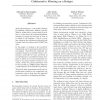Free Online Productivity Tools
i2Speak
i2Symbol
i2OCR
iTex2Img
iWeb2Print
iWeb2Shot
i2Type
iPdf2Split
iPdf2Merge
i2Bopomofo
i2Arabic
i2Style
i2Image
i2PDF
iLatex2Rtf
Sci2ools
116
click to vote
JMLR
2010
2010
Collaborative Filtering on a Budget
Matrix factorization is a successful technique for building collaborative filtering systems. While it works well on a large range of problems, it is also known for requiring significant amounts of storage for each user or item to be added to the database. This is a problem whenever the collaborative filtering task is larger than the medium-sized Netflix Prize data. In this paper, we propose a new model for representing and compressing matrix factors via hashing. This allows for essentially unbounded storage (at a graceful storage / performance trade-off) for users and items to be represented in a pre-defined memory footprint. It allows us to scale recommender systems to very large numbers of users or conversely, obtain very good performance even for tiny models (e.g. 400kB of data suffice for a representation of the EachMovie problem). We provide both experimental results and approximation bounds for our compressed representation and we show how this approach can be extended to multip...
Collaborative Filtering | Collaborative Filtering Systems | Collaborative Filtering Task | JMLR 2010 |
Related Content
| Added | 19 May 2011 |
| Updated | 19 May 2011 |
| Type | Journal |
| Year | 2010 |
| Where | JMLR |
| Authors | Alexandros Karatzoglou, Alexander J. Smola, Markus Weimer |
Comments (0)

